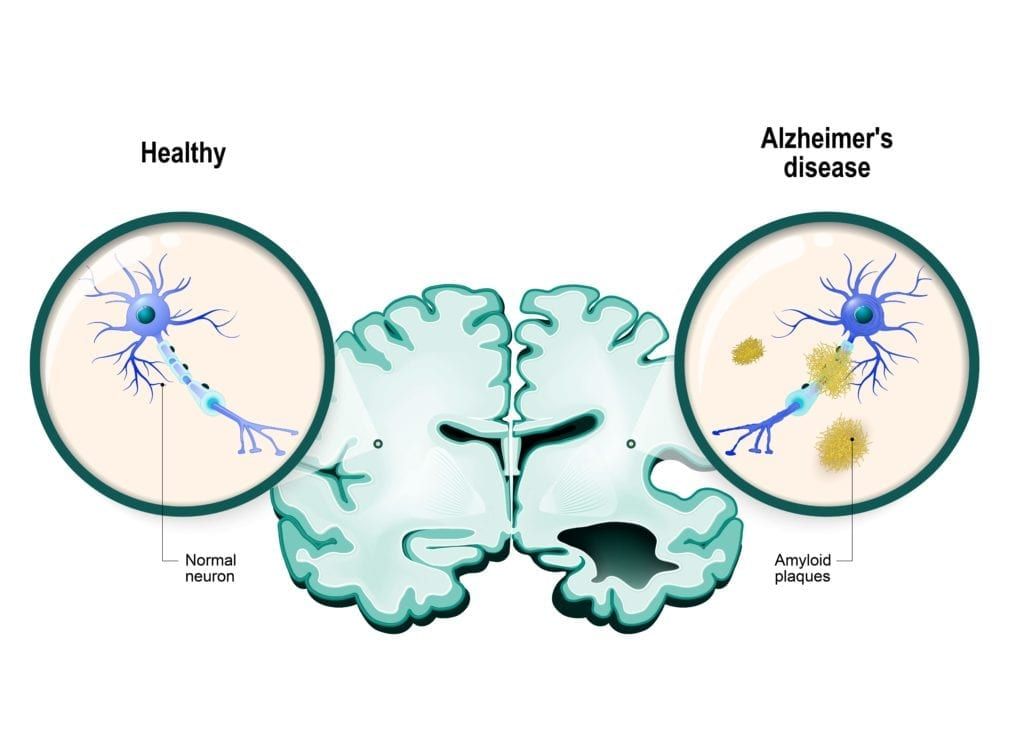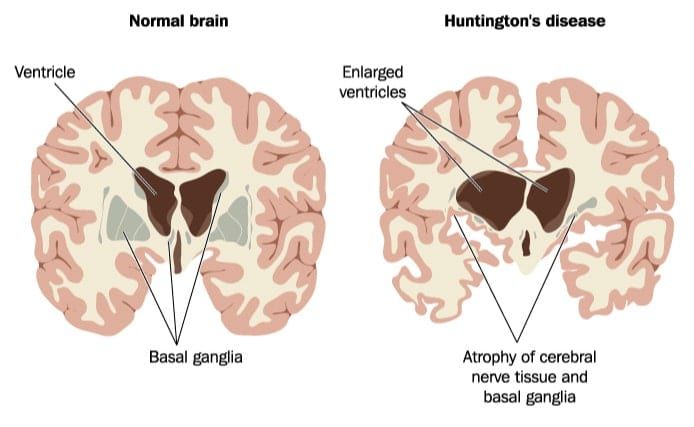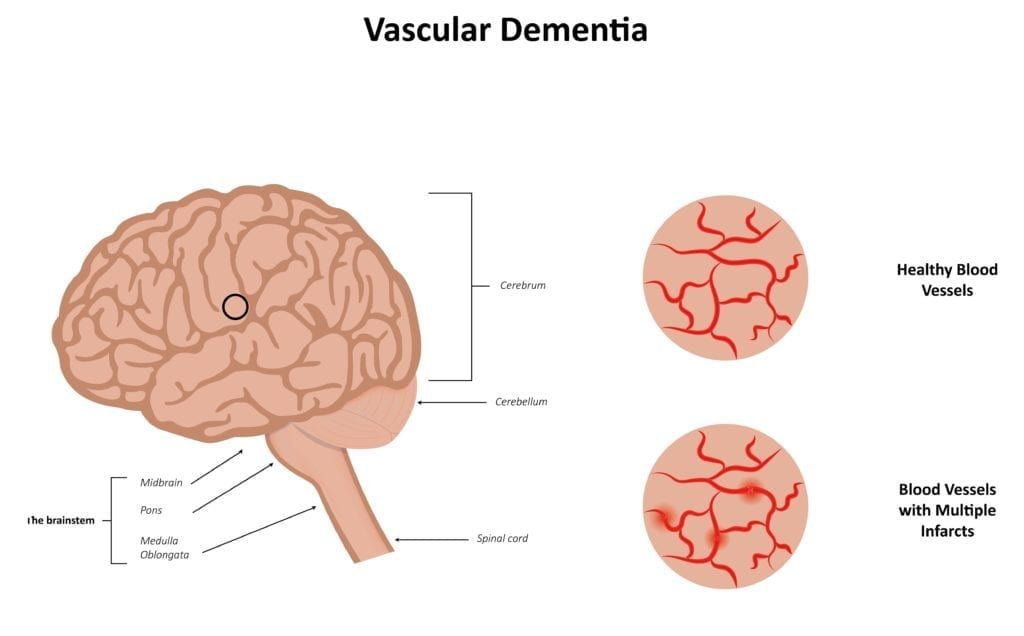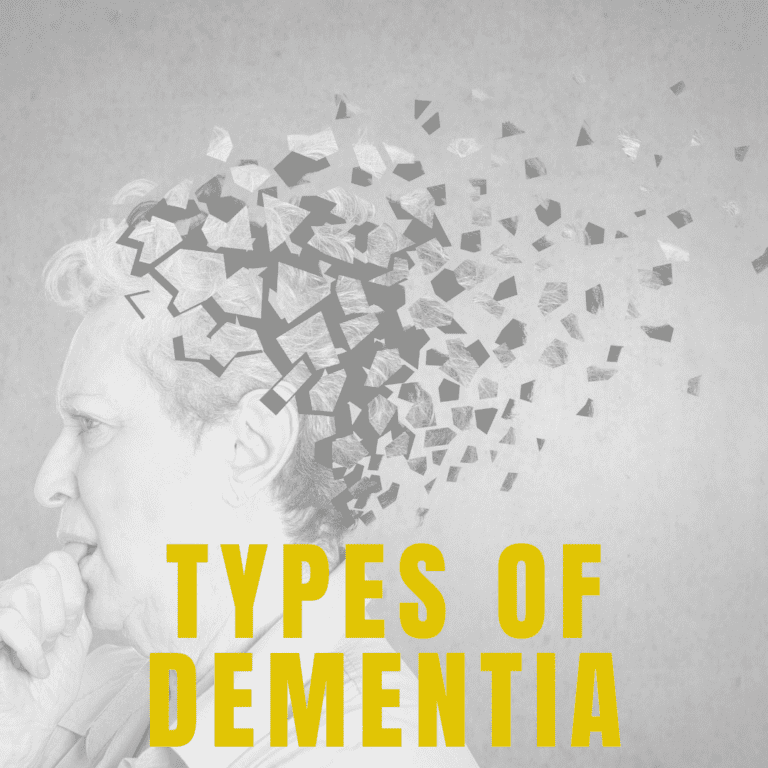Did you know that Alzheimer’s and dementia are not the same thing and that there are different types of dementia? Dementia is a term used to describe a decline in mental ability that interferes with daily life and is characterized by problems with memory, reasoning, and thinking. There are several different types of dementia, including:

Alzheimer’s Disease
This is the most common disease associated with dementia and it accounts for 60-80% of dementia cases. Because of this, many people incorrectly assume that Alzheimer’s and dementia are synonymous. Rather, dementia is a symptom caused by Alzheimer’s that will eventually be accompanied by other symptoms such as disorientation, confusion, behavioral changes, and trouble eating, speaking, and walking.
Creutzfeldt-Jakob Disease
This type of dementia progresses at a more rapid pace than other types. It occurs when prion proteins in the brain fold into an abnormal 3-D shape and destroy brain cells. Creutzfeldt-Jakob disease rapidly decreases thinking, reasoning, and involuntary muscle movements, as well as causing confusion, walking problems, and mood changes.
Frontotemporal Dementia (FTD)
FTD occurs when there is progressive nerve loss in the frontal or temporal lobes of the brain. This results in a loss of function that can cause behavior or personality changes, inability to produce or understand language, and motor function disturbances. There are three subtypes of FTD depending on the part of the brain that is affected and the types of symptoms that result.

Huntington’s Disease (HD)
HD occurs when a defective gene on chromosome 4 codes a defective genetic protein. This defective genetic protein eventually causes changes in the central area of the brain. Unfortunately, this causes progressive problems with movement, mood, and thinking.
Korsakoff Syndrome
Korsakoff syndrome occurs when there is a severe deficiency of thiamine (vitamin B-1) in the body. Thiamine is used by brain cells to produce energy from sugar in order to function properly. Consequently, when there is not enough thiamine in the body, the brain cells cannot function properly and can cause problems with memory. Korsaoff syndrome is most commonly caused by excessive amounts of alcohol, but it can also be caused by AIDS, certain cancers, poor nutrition, chronic infections, and a few other conditions.
Lewy Body Dementia (LBD)
LBD is believed to be the third most common type of dementia and accounts for 5-10% dementia cases. It occurs when abnormal microscopic deposits, known as Lewy bodies, damage the brain cells. Lewy bodies are also associated with Parkinson’s disease, meaning that people with LBD may experience Parkinson’s-like symptoms such as movement problems, rigid muscles, hunched posture, and trouble walking.
Mixed Dementia
Mixed dementia occurs when there is more than one cause of dementia present at the same time. This is commonly seen with Alzheimer’s disease and vascular dementia, however it can also be with Alzheimer’s, vascular dementia, and lewy body dementia. Research is still being done on mixed dementia, but it is believed that this type of dementia is more common that previously thought.
Normal Pressure Hydrocephalus (NPH)
NPH occurs when excess cerebrospinal fluid accumulates in the fluid-filled chambers of the brain without causing a change in pressure. It can, however, cause the chambers to enlarge and damage surrounding brain tissue. This can cause problems with walking, thinking, reasoning, and bladder control. Oftentimes, NPH is misdiagnosed as Alzheimer’s or Parkinson’s disease.
Parkinson’s Disease Dementia
This form of dementia occurs in individuals who have had Parkinson’s disease for about a year and is characterized by a decline in thinking and reasoning. This is because the brain changes associated with Parkinson’s begin with the parts of the brain that control movement and then spread to other parts of the brain that control mental functions.
Posterior Cortical Atrophy (PCA)
PCA occurs when the outer layer of the rear part of the brain begins to degenerate. The degeneration associated with PCA is similar to Alzheimer’s, but it occurs in a different part of the brain. Additionally, some cases of PCA produce changes similar to Lewy Body dementia and Cruetzfeldt-Jakob disease.

Vascular Dementia
Vascular dementia occurs when certain conditions block or reduce blood flow to specific parts of the brain responsible for thinking and reasoning. This form of dementia can occur after a stroke or other conditions that impede regular blood flow. Vascular dementia is also sometimes referred to as vascular cognitive impairment (VCI) because of the way it can change one’s ability to think.

Dr. Kashouty, a diplomate of the American Board of Psychiatry and Neurology (ABPN), practices general neurology with fellowship trained specialization in clinical neurophysiology. Dr. Kashouty finds the form and function of the nerves and muscles the most interesting part of neurology, which is what led him to specialize in neurophysiology with more emphasis on neuromuscular conditions. He treats all neurological diseases, but his main focus is to treat and manage headaches, movement disorders and neuromuscular diseases.




